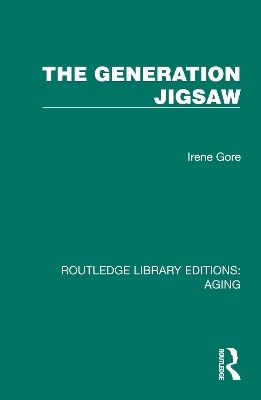
The Generation Jigsaw
Seiten
2024
Routledge (Verlag)
978-1-032-69614-0 (ISBN)
Routledge (Verlag)
978-1-032-69614-0 (ISBN)
In this title, first published in 1976, Gore explores some of the problems which face older people in the family and the community. Her attitude, differing from many attitudes and practices at the time, was that people in old age are capable of expanding their interests and activities, given encouragement and opportunity.
In The Generation Jigsaw, originally published in 1976, Irene Gore explores some of the problems which face older people in the family and the community. Her attitude, differing from many attitudes and practices at the time, was that people in old age are capable of expanding their interests and activities, given encouragement and opportunity.
Dr Gore is specifically not concerned with ill people, invalids or the severely disadvantaged. ‘It is my conviction’, she writes, ‘that the problems of the reasonably fit, reasonably independent majority of older people deserve to be considered … The injunction to honour one’s father and mother is part of our ethic, and we traditionally interpret this as “taking care” of them. But “taking care” of older people carries the risk of making them too passive and dependent, of blurring their individuality.’ Whereas in former times a person had a position to look forward to in later years – the regard of the family and the community and the status that experience gave – now the tendency is to channel and guide our elders into a mode of life which someone else thinks is best for them.
Dr Gore points the way forward to a livelier, more fulfilled community of people of all ages. She has a scientifically trained mind capable of seeing to the core of the problem, and a genuine concern for the true welfare of older people – and of their younger relatives who will become old in their turn. She approaches her subject with lucidity and an unsentimental humanity, based on years of research on the biological aspects of ageing and hard thinking about the personal and social problems encountered by the elderly. She dispels myths and suggests commonsense solutions and guidelines for improving the quality of life for us all.
In The Generation Jigsaw, originally published in 1976, Irene Gore explores some of the problems which face older people in the family and the community. Her attitude, differing from many attitudes and practices at the time, was that people in old age are capable of expanding their interests and activities, given encouragement and opportunity.
Dr Gore is specifically not concerned with ill people, invalids or the severely disadvantaged. ‘It is my conviction’, she writes, ‘that the problems of the reasonably fit, reasonably independent majority of older people deserve to be considered … The injunction to honour one’s father and mother is part of our ethic, and we traditionally interpret this as “taking care” of them. But “taking care” of older people carries the risk of making them too passive and dependent, of blurring their individuality.’ Whereas in former times a person had a position to look forward to in later years – the regard of the family and the community and the status that experience gave – now the tendency is to channel and guide our elders into a mode of life which someone else thinks is best for them.
Dr Gore points the way forward to a livelier, more fulfilled community of people of all ages. She has a scientifically trained mind capable of seeing to the core of the problem, and a genuine concern for the true welfare of older people – and of their younger relatives who will become old in their turn. She approaches her subject with lucidity and an unsentimental humanity, based on years of research on the biological aspects of ageing and hard thinking about the personal and social problems encountered by the elderly. She dispels myths and suggests commonsense solutions and guidelines for improving the quality of life for us all.
Irene Gore
Introduction. Part I: A Positive and Hopeful View of Ageing 1. Mental and Physical Decline is not Inevitable 2. Good Health in Later Years Part II: Family Situations 3. A ‘Ground-plan’ of Family Situations Part III: Attitudes Within the Family 4. Older Persons’ Attitudes 5. The Managing Generation 6. Why an Older Person May Be ‘Difficult’ 7. Voicing Anxieties and Problems 8. A Boring Person 9. Attitudes Helpful to Older People 10. Opportunities for Involvement Part IV: Attitudes to Older People Within the Community 11. The Well-being of Older People Within a Community 12. The Quality of Life in Our Later Years. Index.
| Erscheinungsdatum | 14.05.2024 |
|---|---|
| Reihe/Serie | Routledge Library Editions: Aging |
| Verlagsort | London |
| Sprache | englisch |
| Maße | 129 x 198 mm |
| Gewicht | 412 g |
| Themenwelt | Geisteswissenschaften ► Psychologie ► Allgemeine Psychologie |
| Geisteswissenschaften ► Psychologie ► Entwicklungspsychologie | |
| Medizin / Pharmazie ► Medizinische Fachgebiete ► Psychiatrie / Psychotherapie | |
| Studium ► Querschnittsbereiche ► Prävention / Gesundheitsförderung | |
| Sozialwissenschaften ► Soziologie | |
| ISBN-10 | 1-032-69614-1 / 1032696141 |
| ISBN-13 | 978-1-032-69614-0 / 9781032696140 |
| Zustand | Neuware |
| Haben Sie eine Frage zum Produkt? |
Mehr entdecken
aus dem Bereich
aus dem Bereich
das Manual zur psychologischen Gesundheitsförderung
Buch | Hardcover (2023)
Springer Berlin (Verlag)
39,99 €
Orthomolekulare Medizin in Prävention, Diagnostik und Therapie
Buch | Hardcover (2022)
Thieme (Verlag)
71,00 €


